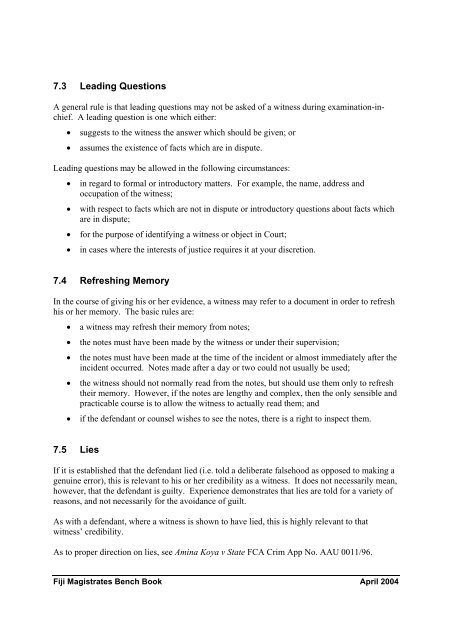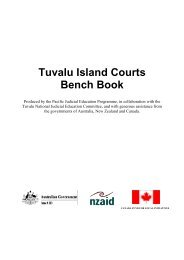Fiji Magistrates Bench Book - Federal Court of Australia
Fiji Magistrates Bench Book - Federal Court of Australia
Fiji Magistrates Bench Book - Federal Court of Australia
Create successful ePaper yourself
Turn your PDF publications into a flip-book with our unique Google optimized e-Paper software.
7.3 Leading Questions<br />
A general rule is that leading questions may not be asked <strong>of</strong> a witness during examination-inchief.<br />
A leading question is one which either:<br />
• suggests to the witness the answer which should be given; or<br />
• assumes the existence <strong>of</strong> facts which are in dispute.<br />
Leading questions may be allowed in the following circumstances:<br />
• in regard to formal or introductory matters. For example, the name, address and<br />
occupation <strong>of</strong> the witness;<br />
• with respect to facts which are not in dispute or introductory questions about facts which<br />
are in dispute;<br />
• for the purpose <strong>of</strong> identifying a witness or object in <strong>Court</strong>;<br />
• in cases where the interests <strong>of</strong> justice requires it at your discretion.<br />
7.4 Refreshing Memory<br />
In the course <strong>of</strong> giving his or her evidence, a witness may refer to a document in order to refresh<br />
his or her memory. The basic rules are:<br />
• a witness may refresh their memory from notes;<br />
• the notes must have been made by the witness or under their supervision;<br />
• the notes must have been made at the time <strong>of</strong> the incident or almost immediately after the<br />
incident occurred. Notes made after a day or two could not usually be used;<br />
• the witness should not normally read from the notes, but should use them only to refresh<br />
their memory. However, if the notes are lengthy and complex, then the only sensible and<br />
practicable course is to allow the witness to actually read them; and<br />
• if the defendant or counsel wishes to see the notes, there is a right to inspect them.<br />
7.5 Lies<br />
If it is established that the defendant lied (i.e. told a deliberate falsehood as opposed to making a<br />
genuine error), this is relevant to his or her credibility as a witness. It does not necessarily mean,<br />
however, that the defendant is guilty. Experience demonstrates that lies are told for a variety <strong>of</strong><br />
reasons, and not necessarily for the avoidance <strong>of</strong> guilt.<br />
As with a defendant, where a witness is shown to have lied, this is highly relevant to that<br />
witness’ credibility.<br />
As to proper direction on lies, see Amina Koya v State FCA Crim App No. AAU 0011/96.<br />
<strong>Fiji</strong> <strong>Magistrates</strong> <strong>Bench</strong> <strong>Book</strong> April 2004
















